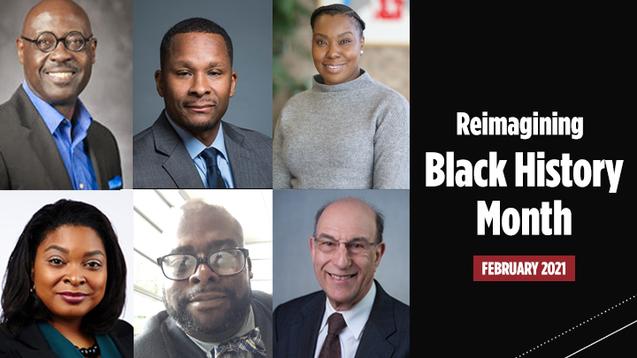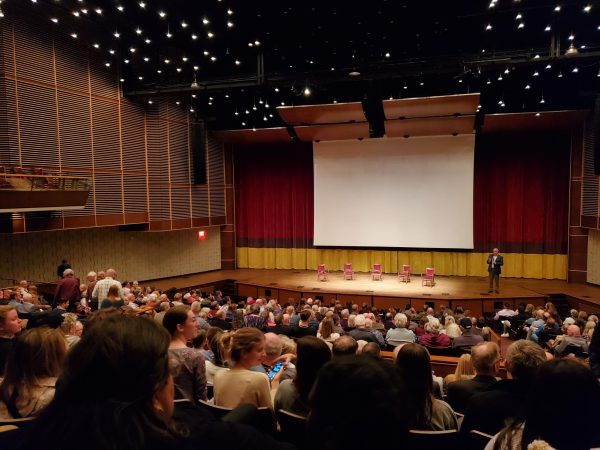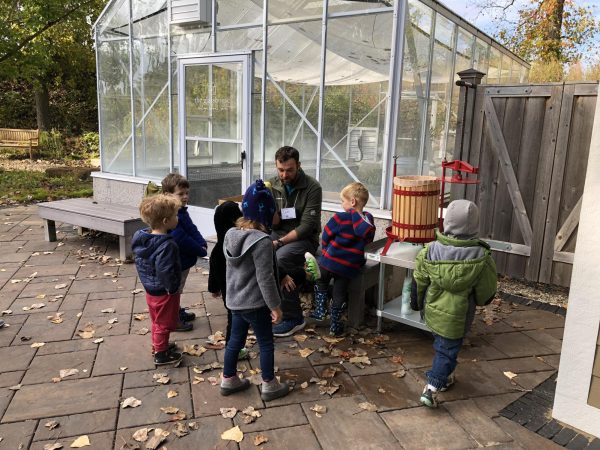Black History Month 2021 resonates with Calvin community after year of turmoil
Calvin’s celebration of Black History Month this year consisted of six online lectures throughout the month of February.
In a lecture given to a Calvin audience on Feb. 11, Dr. Mark Hopson spoke of an epidemic within a pandemic. The pandemic, of course, is the one that has impacted nearly every facet of human life since COVID-19 went viral just over a year ago. The epidemic, Hopson said, was the killing of Black physical and intellectual bodies that has become common in the United States. Hopson’s distinction between pandemic and epidemic demonstrated the two marked developments in the last year that made Black History Month 2021 particularly poignant.
Hopson’s lecture was one of six given as a part of Calvin’s Black History Month celebration. Other speakers included Dr. Willie Jennings, Lyonel LaGrone, Nicole Parker, Rev. Dr. Shively Smith and Richard Rothstein. Recordings of the lectures can be accessed on Calvin’s YouTube channel.
The lectures were linked under the theme “Reimagining Black History Month,” chosen by LaGrone, who organized the events in addition to giving a lecture himself as Calvin’s program coordinator for the Center for Intercultural Student Development (CISD).
LaGrone said the theme was selected in particular consideration of our historical context. The work of past Black heroes, like Martin Luther King, Rosa Parks, and Madam C. J. Walker, has resulted in increased recognition of the rights of Black people, giving considerable momentum to the movement, but complete equality hasn’t been reached.
“Black History Month is coming around every year, it’s being celebrated, yet the acknowledgement of the past heroes—what happens is that stuff started becoming more symbolic than real,” LaGrone said.
LaGrone noted how the prevalence of murders of Black people at the hands of police demonstrates that systemic injustice is still rampant, emphasizing how it is inconsistent to celebrate heroes of the Black movement without fighting systemic injustice that still occurs today.
“The purpose of Reimagining Black History Month was for us to understand that we are still creating Black history,” LaGrone said.
The series, which included Jennings’ discussion of the implications of whiteness and Rothstein’s analysis of housing policies that endorsed segregation, was intended to give an account of what brought us to this moment and history and how we can move forward from here.
“The role of Black History Month should be to give us a real perspective from African Americans and give everybody a way to move forward–to make it more real than symbolic,” LaGrone said. “Now, with Reimagining Black History Month, anyone who actually watches those six videos and digests the information, whether you subscribe to it or not, your thinking has now been transformed.”
Reacting to the summer of 2020
For some students on campus, Black History Month had particular significance this year after George Floyd’s killing marked another death of a Black body at the hands of police, leading to nationwide protests that took place over the course of the summer.
“In the year since 2020’s Black History Month, Black students on Calvin heard of Ahmaud Arbery and Breonna Taylor’s murders, watched George Floyd’s murder, and heard about how badly COVID-19 has been ravaging communities of color,” said Noah Keene. “This year’s Black History Month felt so much more sober due in part to the fact that the last year has been a seemingly never-ending demonstration of how Black life is devalued in America.”
Acacia Walter-Rooks believed that Black History Month received more attention this year in light of last summer’s events.
“I think Black History Month was more recognized this year and had a bigger impact on several people because of the protest this summer,” Walter-Rooks said. “I like to think that more people are now fully aware of why we have a Black History Month and the significance it holds.”
Calvin’s celebration of Black History Month looked similar in format to last year’s, with speakers presenting throughout the month, although some of the content was different in response to the events between February 2020 and 2021.
“Some of the people that were speaking addressed some of the issues that the Black community was facing during the time, but other than that there weren’t a lot of differences between [last year’s celebration and this year’s celebration],” said Shelton Rodriguez, a sophomore student who helped coordinate Black History Month programming.
Dr. Smith’s discussion of Jesus’ crucifixion in light of African American Biblical histories was particularly impactful for Rodriguez.
“It was just powerful in the way that it just like connected the stories and the plight of the Black people but also in correlation to the religion that people believe in, that I believe in,” said Rodriguez.
Placing Black History Month in context
Calvin’s celebration of Black History Month is only part of its efforts to fight racism year-round as the university strives to become a more just and inclusive place.
Students referenced the march for Breonna Taylor last fall as well as the work of Learn, Educate, Act, Diversify (LEAD), the African Student Association (ASA), the Students of Color Presidential Advisory Group, and the Grassroots floor as positive signs in the university’s fight against racism.
“I absolutely love what the ASA and LEAD program collaboration did for Breonna Taylor which was an event that was empowering and unforgettable,” said Tarryn Brooks, a Calvin freshman. “To see students gathered for a Black woman, who I feel still needs justice, was amazing because it made me feel safe, seen, and supported.”
Rodriguez also noted the signs of growth he has seen on campus.
“Calvin is by no means perfect and I don’t think it ever will be, but it is making an effort. I can attest to that because me and a lot of other students are on the task force trying to propel this change,” said Rodriguez, referencing the Presidential Advisory Group and LEAD programs, both of which he is a member.
Still, students emphasized that Calvin must continue to grow in efforts of anti-racism. Walter-Rooks noted Calvin’s delayed response to the killing of George Floyd and the notable lack of racial diversity in the student body as signs that there is work still to be done.
“I think that Calvin still has a lot more space to grow as they should be opening their doors up and advertising more to minorities to raise the ratio here,” Walter-Rooks said. “I also think that they should take issues like what happened this summer more seriously rather than only thinking about their reputation and more about the faculty and students that were affected by this.”
LaGrone said that keeping the CISD funded would be a key step in the days to come, noting how many institutions cut their diversity and anti-racism programs first when facing financial hardships. He also encouraged the Calvin administration to continue considering how God might be calling them to seek racial justice.
LaGrone wanted to thank President Michael Le Roy, Dr. Michelle Loyd-Paige, Jane Bruin, and others at Calvin for their openness and work in allowing for the series to take place.
“Calvin, by virtue of allowing this Black History Month series, has demonstrated a willingness to be open to the thoughts and ideas of people of color, in the faith community and in the secular community, so they should be commended for that, because there’s a lot of places where this would’ve been stopped right away.…” LaGrone said. “Now is the hard work of actually listening to what was said, and actually moving accordingly.”








